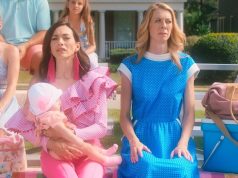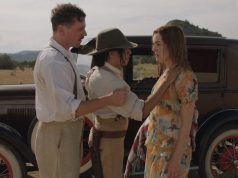Bettie Page was a pinup model in the 1950s, at a time when there were a lot of pinup models but not very many who were willing to pose nude. Page, a Baptist girl from Tennessee, overcame whatever qualms she had about that and was soon one of the most famous models in America. Then, after a few years in the sun, she left the business, possibly due to a religious awakening.
It sounds like Bettie led an interesting life, which is why “The Notorious Bettie Page” is a disappointing film. Written by Mary Harron and Guinevere Turner and directed by Harron (the same duo who brought “American Psycho” to the screen), “Notorious” delivers the who, what and where of Bettie’s life but is scant on the hows and whys. It’s a shallow recounting of events without theme or purpose.
Bettie is played by the lovely and too often underemployed Gretchen Mol as a down-home girl who, after a lousy first marriage in her native Nashville, moves to New York City in 1949. Wide-eyed, naive, and intent on becoming an actress, Bettie stumbles into modeling and doesn’t seem to mind the lecherous photographers who ogle sweatily at her. In fact, she enjoys posing.
Before long, she is working for Irving Klaw (Chris Bauer) and his sister Paula (Lili Taylor), chief purveyors of the nation’s bondage/S&M magazines. They run it like a business, not a free-for-all, don’t let the photographers touch the girls, are careful to adhere to decency laws (no pubic hair!), and so forth.
The bondage photos involve clothing (barely), but Bettie does some nude pictorials, too. She sees everything as a form of acting, or at least she says she does. “God gave me the talent to pose for pictures,” she says in her innocent Southern drawl. “And it seems to make people happy.”
Is that really how Bettie Page felt? I dunno. It’s hard to tell whether that’s even how this fictionalized version of her feels. Harron and Turner’s screenplay, and Mol’s reading of it, keeps everything on the surface, with very little exploration into people’s motives or psyches. There is the merest hint of sexual abuse when Bettie is young, and a subsequent rape, with neither issue ever referred to subsequently. Surely those things helped carve Bettie’s path in life (assuming they’re true), but the film only introduces them so it can ignore them again.
Most of the film is in black-and-white except for a few bursts of color, notably when Bettie visits Florida, supposedly her place of refuge. Most of the film is also told in flashback, centered around the Senate hearings on juvenile delinquency, at which the Klaws and Bettie are called to testify. Bettie’s testimony is bound to liven things up, you figure, but no: She is dismissed without speaking, and the hearings are over.
“The Notorious Bettie Page” has a modestly enjoyable storyline; it just never goes anywhere with it. Like so many biopics, it tells us what the subject did without telling us why.
C+ (1 hr., 30 min.; )





